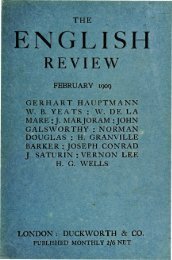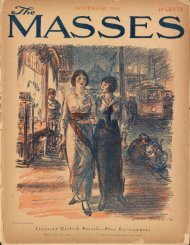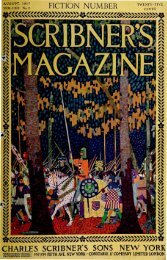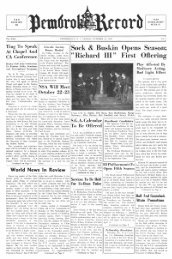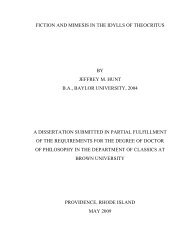View PDF - Brown Library
View PDF - Brown Library
View PDF - Brown Library
Create successful ePaper yourself
Turn your PDF publications into a flip-book with our unique Google optimized e-Paper software.
The steamship Ancon passing Cucaracha Slide, the first vessel to pass through the Panama Canal.<br />
MAGAZINE NOTES<br />
Colonel George W. Goethals's own story of<br />
"The Building of the Panama Canal" will begin<br />
in the March number. Thousands have<br />
visited the Canal during and since its building,<br />
and none have failed to bring away with them<br />
an almost overwhelming impression of its magnitude<br />
and wonder at the skill and administrative<br />
ability that have made it possible. Mr.<br />
Bishop tells in this number, in his "Personality<br />
of Colonel Goethals," about the man at the<br />
head. Colonel Goethals will tell of the work<br />
as it progressed, of the many problems that<br />
had to be solved. In the first article he will<br />
tell of his appointment by President Roosevelt,<br />
of his succeeding John F. Stevens, who had<br />
resigned, of the rather delicate readjustment<br />
of conditions, and especially of the "Success<br />
of Government Methods," which dominated<br />
everything. Colonel Goethals makes some pertinent<br />
remarks about the comments of a certain<br />
congressional committee that was inclined<br />
to criticise the relations between the army and<br />
the laboring man. Colonel Goethals never appeared<br />
in uniform.<br />
"I must confess that the slurs and insinuations<br />
were not relished, and in replying I<br />
attempted to make it clear that the army per<br />
se was not in charge in a military sense; that<br />
there was to be no militarism, no salutes; that<br />
I had left behind me all my military duties<br />
and would command the army of Panama,<br />
fighting nature for the accomplishment of the<br />
end that had brought us down here. Their<br />
cause was mine, and we had common enemies,<br />
Culebra Cut and the climate, and the completion<br />
of the Canal would be our victory. I<br />
intended to be the commanding officer, but<br />
the chiefs of divisions would be the colonels,<br />
the foremen the captains, and no one who did<br />
his duty had aught to fear from militarism."<br />
Ex-Mayor of New York George B. McClellan<br />
, and Professor of Economic History, Princeton<br />
University, has written an article for the<br />
March number that will be read with great<br />
interest. It is a remarkable review of "The<br />
War from an American Point of <strong>View</strong> r ,'' a statesmanlike<br />
comment upon the position and responsibilities<br />
of the nations involved and of the<br />
possible effect of the war upon our own future.<br />
He says that " to assume the present war is the<br />
work of any one man or group of men is to<br />
permit prejudice to warp judgment and to<br />
allow sympathy to befog a clear understanding<br />
of facts." He has some very pertinent and<br />
very reasonable things to say about the question<br />
of an adequate armament for our coasts<br />
and a formidable navy.<br />
"Firmly resisting the efforts of both sides in<br />
this war to entangle and embroil us, preserving<br />
a strict neutrality between the combatants<br />
both now and hereafter, we should prepare to<br />
defend ourselves so that if attack ever comes<br />
we may be able to resist successfully."<br />
(Continued on page 10.) 7



